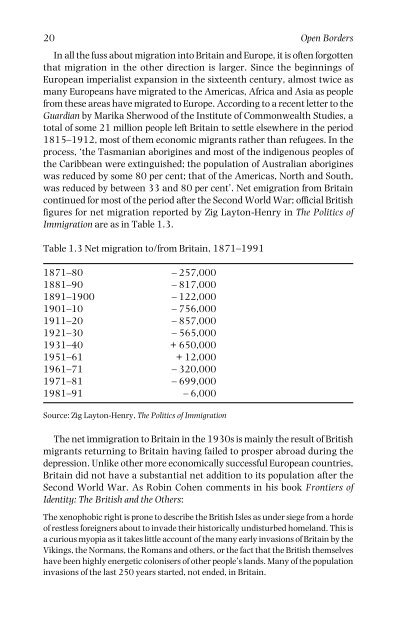Open%20borders%20The%20case%20against%20immigration%20controls%20-%20Teresa%20Hayter
Open%20borders%20The%20case%20against%20immigration%20controls%20-%20Teresa%20Hayter
Open%20borders%20The%20case%20against%20immigration%20controls%20-%20Teresa%20Hayter
You also want an ePaper? Increase the reach of your titles
YUMPU automatically turns print PDFs into web optimized ePapers that Google loves.
20 Open Borders<br />
In all the fuss about migration into Britain and Europe, it is often forgotten<br />
that migration in the other direction is larger. Since the beginnings of<br />
European imperialist expansion in the sixteenth century, almost twice as<br />
many Europeans have migrated to the Americas, Africa and Asia as people<br />
from these areas have migrated to Europe. According to a recent letter to the<br />
Guardian by Marika Sherwood of the Institute of Commonwealth Studies, a<br />
total of some 21 million people left Britain to settle elsewhere in the period<br />
1815–1912, most of them economic migrants rather than refugees. In the<br />
process, ‘the Tasmanian aborigines and most of the indigenous peoples of<br />
the Caribbean were extinguished; the population of Australian aborigines<br />
was reduced by some 80 per cent; that of the Americas, North and South,<br />
was reduced by between 33 and 80 per cent’. Net emigration from Britain<br />
continued for most of the period after the Second World War; official British<br />
figures for net migration reported by Zig Layton-Henry in The Politics of<br />
Immigration are as in Table 1.3.<br />
Table 1.3 Net migration to/from Britain, 1871–1991<br />
1871–80 – 257,000<br />
1881–90 – 817,000<br />
1891–1900 – 122,000<br />
1901–10 – 756,000<br />
1911–20 – 857,000<br />
1921–30 – 565,000<br />
1931–40 + 650,000<br />
1951–61 + 12,000<br />
1961–71 – 320,000<br />
1971–81 – 699,000<br />
1981–91 – 6,000<br />
Source: Zig Layton-Henry, The Politics of Immigration<br />
The net immigration to Britain in the 1930s is mainly the result of British<br />
migrants returning to Britain having failed to prosper abroad during the<br />
depression. Unlike other more economically successful European countries,<br />
Britain did not have a substantial net addition to its population after the<br />
Second World War. As Robin Cohen comments in his book Frontiers of<br />
Identity: The British and the Others:<br />
The xenophobic right is prone to describe the British Isles as under siege from a horde<br />
of restless foreigners about to invade their historically undisturbed homeland. This is<br />
a curious myopia as it takes little account of the many early invasions of Britain by the<br />
Vikings, the Normans, the Romans and others, or the fact that the British themselves<br />
have been highly energetic colonisers of other people’s lands. Many of the population<br />
invasions of the last 250 years started, not ended, in Britain.


